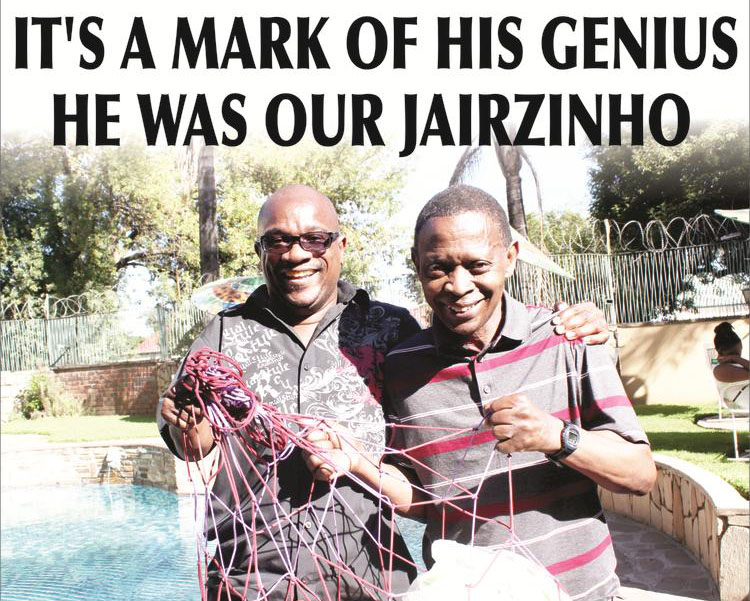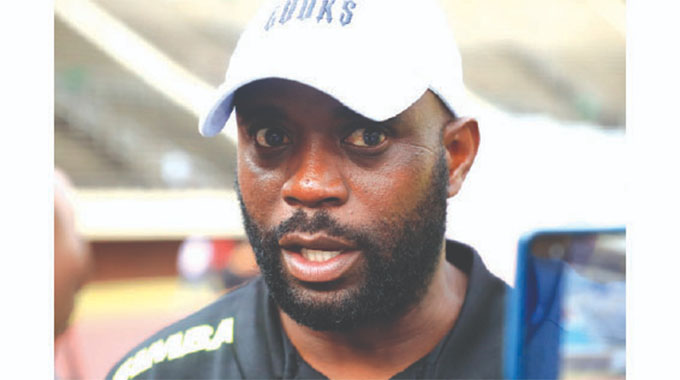Godoka goes down memory lane

 Paul Mundandi Sports Reporter
Paul Mundandi Sports Reporter
LEGENDARY Zimbabwean footballer Robert Godoka says the country should strive to create opportunities to export players overseas if they are to catch up with the current demands of the world of football.
Godoka (63), an elusive and lethal goal-poacher of the late 1970s and early 1980s who played top-flight football in South Africa, the United States and Canada at a time when it was difficult for black players of African origin to be appreciated abroad, is back home on a brief tour.
He now lives in the UK.
Also read:
. . . so good he was our Jairzinho
“I am proudly Zimbabwean and I was excited to hear that we qualified for this year’s African Cup of Nations finals and I enjoyed watching all the matches.
“I am proud that the boys managed to hold their own against the highly-fancied teams. Our only problem was that in Zimbabwe our players have small frames.
“Just take a look at the West African countries, especially Cameroon, Cote d’Ivoire and Senegal, they are very big and strong and it’s something that worked against us in Gabon. During our era Zambia had the likes of Godfrey Chitalu and Peter Kaumba, they were big, strong and talented players.
“We also need our players to be plying their trade in the European leagues and for that to happen we must have proper structures at junior level and academies.
“Children must have footballs at home and even at training and not to have a situation where 22 children chase one ball,” said Godoka.
He also came out in support of former Warriors coach Callisto Pasuwa for helping Zimbabwe to qualify for the 2017 Nations Cup finals.
“I think Pasuwa is not a bad coach. I am proud of him. But to be frank with you, the current crop of coaches in Zimbabwe is sub-standard as there is lack of exposure (at international level).
“Before taking part at the Nations Cup, ZIFA should have made every effort to send Pasuwa either to England, Spain or Denmark for attachment and this could have improved his coaching skills.
“He was and still is a good coach, but as Zimbabwe we are lacking in that aspect of capacity building.”
He believes the current crop of players who are plying their trade in the domestic league are not as good or as talented as the ones that he used to play with or against in the 1970s and early 1980s.
“One might argue that we didn’t take Zimbabwe anywhere, but one must also not forget that we failed to play in international matches for a very long time because of the sanctions that were imposed on the then Ian Smith-led Rhodesian government.”
Godoka was one of the best dribblers in the country in the late 70s.
Born on April 6, 1953, he started his career at St James Primary School near Mutare and then Hartzell High School at Old Mutare from 1968 to 1971.
Godoka and Barnabas Likombola joined Rio Tinto after arriving first at the rich gold mining area as athletes with Godoka running the short sprints 100m and 200m while Likombola was a 400m sprinter.
Kevin Sheridan, a former Callies player, diverted them to play football.
“I had a very small frame and my first game was all shivers against Dynamos at Gwanzura. Through the encouragement of Phillimon Tigere and Phineas Mutyavaviri I made it to the senior team at Rio Tinto in 1973.”
The strongest Rio Tinto side Godoka played for included Victor Mapanda, Laban Kandi, Mutyavaviri, Grahan Boyle, Gibson “Gezamuchina” Sibanda, Raphael Phiri, Ephert Lungu, Joseph Zulu, Amos Chiseko, Gilbert Sibanda, Richard Manda, Stewart Mugweni, Jubel Phiri, Wonder Phiri, David Chisambe, Byron Manuel and Likombola.
The two great players at Rio Tinto were, however, Joseph Zulu (who prematurely ended the playing career of Sunday Chidzambwa when his tackle broke the Dynamos defender’s leg) and Godoka.
Godoka was the team captain when Rio Tinto won the BAT Rosebowl in 1977 and retained the cup the following year.
His most memorable match was the BAT Rosebowl final against Black Aces in 1977 after beating the then great Zimbabwe Saints side in the semi-finals. Rio Tinto played a friendly match against South African soccer giants Kaizer Chiefs and that was the beginning of a glittering career for Godoka.
“I was talented and I remember going past a cluster of defenders down the line and with my teammates and the rival goalkeeper anticipating that I would cross the ball, I saw some space and I intelligently slotted it past the keeper and that was the winning goal.
“It was the goal that saw Kaizer Chiefs owner Kaizer Motaung taking me to South Africa, but it was not easy. He dispatched two guys back into the country — Gilbert Sekabi and Toy Mostert — who sweet-talked me to change my mind.
“I had a Rhodesian passport and they could not let me go to the USA. I told them that I was given a rare talent by God and I was a unique player. I told them that if they refused me the passage to go to the United States I would go to Mozambique to join the liberation struggle and that is when I was given a British Concessionary passport to enter the USA.
“But at that time, the USA was very cold and we went to Bahamas with New York Cosmos for pre-season training and I was in the same team with Franz Beckenbauer who was the team captain. Pele had just left the club after my arrival. I was later to be denied entry back into the USA and I stayed there until I got a seat on a British aircraft and made my way back to Zimbabwe.
“I only spent two days in Zimbabwe and when Motaung learnt that I was back home in Zimbabwe, he sent me an air ticket and instructed me to come back to South Africa. Upon my arrival there I was taken to Toronto Blizzards in Canada.
“Upon arrival at the airport in Toronto, I was straight away whisked to the stadium for a match where I scored a goal against Petre Lorima and Kaizer Motaung was so excited that he phoned and congratulated me.”
Godoka only lasted six months in Canada and was back to his country of origin to rejoin Rio Tinto.
He was also a regular in the national team and when the country attained its Independence in 1980 he played against Zambia and Mozambique in the Independence celebration matches at Rufaro.
When the team toured Mozambique he went for a drinking binge with his friends — Mozambican players — only to come back to the hotel when the team had already left for the airport.
“I checked for my luggage and my bags were not there. I was told that John Rugg had packed my bags. I caught up with the team at the airport.”
Godoka hung up his boots and briefly coached Smirnoff Tigers in 1982 and 1983. He also worked for the Reserve Bank of Zimbabwe before he left the country in 2007 to settle in England with his family.
Godoka is set to donate 40 soccer balls to his former school Hartzell and the other 40 to St Augustine Mission where his son Robert (Jnr) did his secondary school education and was also a first team player.
Married to Norma, who is a nurse by profession, the couple’s first born child Charlotte is a mechanical scientist in Manchester while Robert (Jnr) is a financial focus analyst.
Their third born child Nyasha is a civil engineer in Durban, while the last born Tatenda is an accountant in London.










Comments